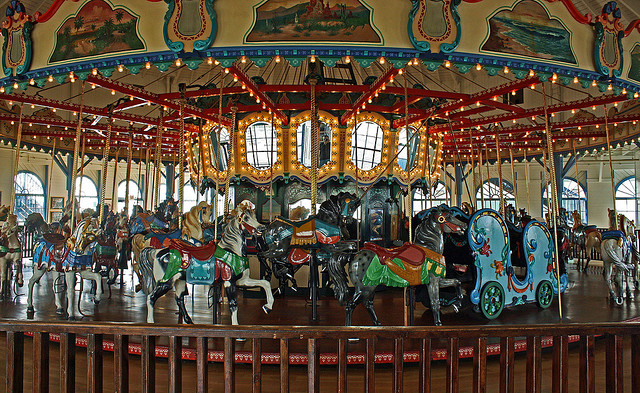
Tower Theater photo credit: Pete Zarria via photopin cc
A fantasy and/or science fiction fan doesn’t have to be bound to watching movies only in the fantasy and science fiction realm. Outside the genre are excellent examples of what story can do. Stretch your horizons and take in these five movies exemplifying story.
Doctor Zhivago – Epic Scale
Most fantasy and science fiction films attempt to be epic in scale. That’s because once a world is imagined, its creator wants to show that world in its most glorious manifestation at its most pivotal moment.
In real history, there’s plenty of fodder for this, seeing how our own world is sadly epic at certain points in time.

St. Basil’s photo credit: Geir Halvorsen via photopin cc
Director David Lean took Boris Pasternak’s Nobel Prize novel on the Russian Revolution and adapted it into an epic motion picture released in 1965. The 60’s – much more than the 70’s – was a time of epics. Look at the Best Picture winners. One epic after another. Big pictures, grand settings, spectacular visuals, top talent, long running times.
The movies even had intermissions then.
Epics were the art of the day. And in the middle of the Cold War, what could be more epic than to look back at a Russia out of control? (Wait… is that now?)
David Lean was especially suited for epics. He had already directed two Oscar-winning pictures based on historic events: The Bridge over the River Kwai, and Lawrence of Arabia.
Armed with another historical drama, Lean delved into the life of a solitary doctor/poet named Yuri Zhivago. The movie shows Zhivago’s humanity, his compassion, his endurance, his love of wife, and his infidelity to same, all played out against the backdrop of a nation’s collapse and its rebirth from one totalitarian government to another. (Has Russia ever had a good government?)
Doctor Zhivago would be great story in space. The names might not even have to change. Parts of Doctor Zhivago remind me of Dune. But in Dune there’s a giant worm rather than one of Lean’s famous trains.
A Room with a View – Little Things
David Lean was a master at dramatic scenes, large vistas, and trains running across exotic settings. Just what’s ordered for an epic.
He wasn’t so good at movies on little things.
Example: A Passage to India. This film is an adaptation of an E.M. Forster novel. Lean made it too big. Forster was more about the little things that connect characters.
Enter James Ivory and Ismail Merchant. They filmed another Forster novel, A Room with a View, with great artistic success.
A Room with a View is a sumptuous movie about little things: Manners over an undercurrent of repressed longing, a juxtaposition of the bold romance of Italy and the social restraint of Edwardian England.
What’s here for the science fiction or fantasy fan to learn?
Stories don’t have to be about big events to reveal characters or societies. A fantasy author that picks up on the little customs and how they shape a culture and a person can make his/her epic more believable and its world more inhabitable.
I’m thinking The Hobbit is a good genre example of this especially as Tolkien gives his humorous and empathetic descriptions of hobbits.
See, it worked for Forster and Tolkien.
The Sting – Plot Twists
The Sting is about a con over a con… and it is a con. The audience is conned. What to believe? Who to trust? What just happened?

The Sting photo credit: On Location in Los Angeles via photopin cc
More twists than a roller coaster, though a carousel is featured. The Sting is that, too, all around and around and mirrors and false perspectives and catchy music.
And here’s the lesson for genre fans: A good plot doesn’t divulge itself too quickly. A little here, a little later, a twist. Keep the viewer engaged.
A good, recent example in science fiction movies is Ender’s Game.
The attraction of science fiction and fantasy for me is that I don’t know what to expect next. And in The Sting – brother! – you don’t know what’s coming next. By the end of the movie, you discover that you didn’t know what had even passed by.
I like that. Dona loved it. This was her favorite movie.
Hmm… Is there something to that?
The Elephant Man – Tragedy
I saw this movie only once, in the theater while I was in college, but it’s stuck with me for all these years. Now, that’s a movie! As Wade and I exited the theater, he said, “If I ever say anything bad about myself again, slap me.”
The Elephant Man immediately came to mind as an example of tragedy in the classic sense. It ends sadly. Most grand operas are like this. (According to the classic definition, Beethoven’s Fidelio, though a serious opera, is really a comedy in that it has a happy ending.)
The thing about The Elephant Man that will interest fantasy and science fiction fans is its handling of a man who barely looks human but comes to define true humanity; who is thought stupid, but shows intelligence; who has not had mercy, but gives it.
A writer in our genre would do as well with his aliens or dwarves or sentient plant life or whatever to paint such a character of depth and humanity.
What’s Up Doc? – Comedy
It’s not mandatory in my household to know the lines to this movie. It just happens that way.
What’s Up Doc? is the quintessential comedy movie. It has everything comedies thrive on: Mistaken identity, slapstick, witty lines, a chase scene.
By the way, the chase scene involves going down Lombard Street then a set of stairs in San Francisco and ends in the Bay. How great is that?

Lombard Street photo credit: nan palmero via photopin cc
But fantasy and science fiction are serious genres. Why bother with comedy?
I would retort by saying, “Comic relief.” Even Star Wars movies have their own comic sidekicks… with varying degrees of success.
For the fantasy and science fiction fan, watching What’s Up Doc? demonstrates the comic potential of story.
And it’s a funny movie.
I mean we all gotta laugh sometimes.



[…] fantasy author discussing The Andy Griffith Show seems a bit odd, but this TV series is an out-genre masterpiece of characterizations, which a fantasy or science fiction author would do well to learn […]